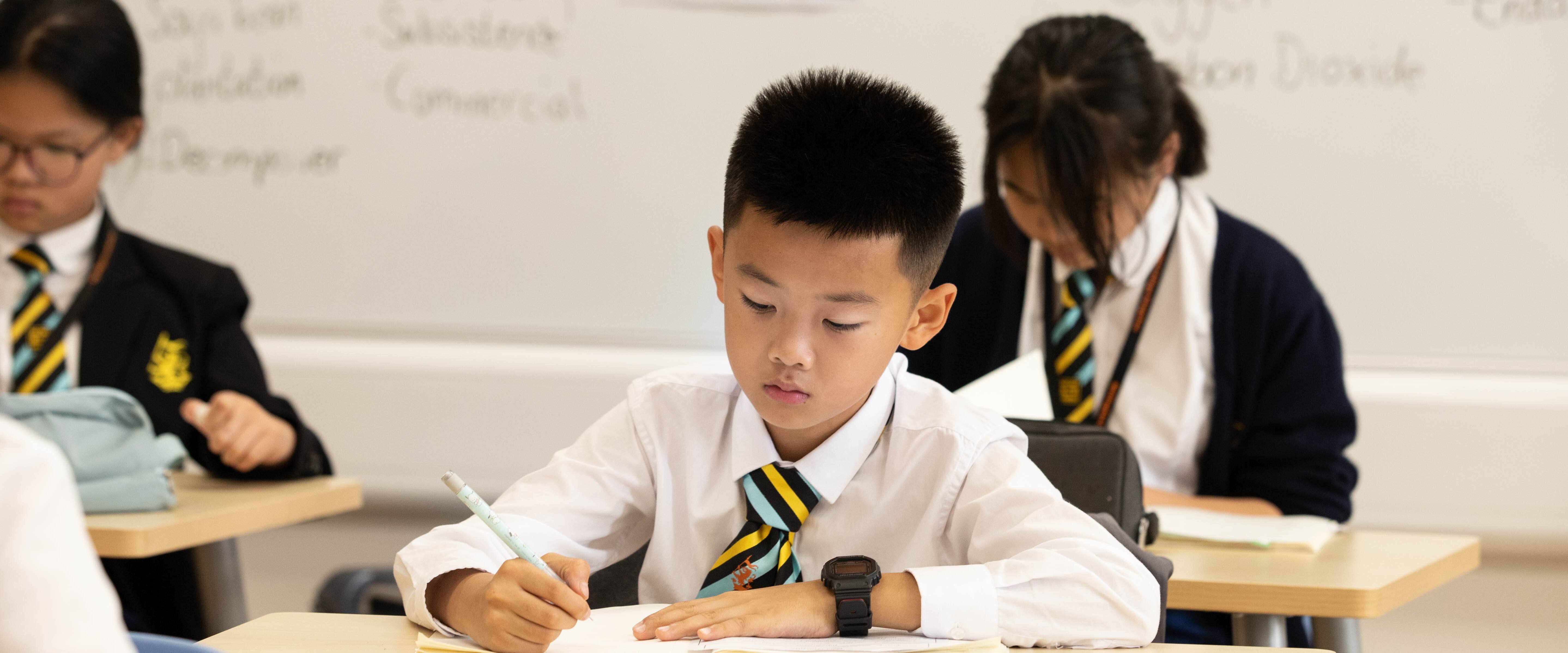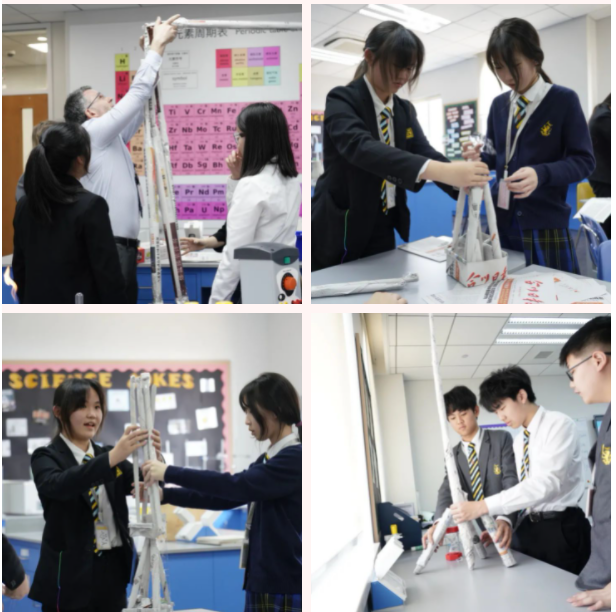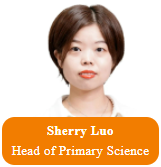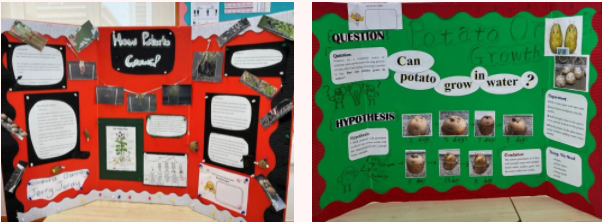

This week pupils had the opportunity to try different activities in science week. It is a chance for them to learn science in a different context and apply their knowledge in another way. One science lesson in each grade was dedicated to science week.
Grade 7
Grade 7 had the opportunity to design and build an egg protector to be posted safely to a different location.

Grade 8
Grade 8 were set the challenge of building the highest possible tower out of just newspaper and a roll of Sellotape. Many of them were able to create a tower approximately 3 metres tall utilising the help of a chair and even a table. Congratulations to pupils in 8E who built the tallest structures and were also the most robust. They even survived the dreaded ‘fan test’, which resembles a 100 km wind speed. The scientific future of China is safe in their hands.

Grade 9
Grade 9 had to use their knowledge of heat transfer to design and build a heat shield.
Whilst there were activities in timetabled lessons, many pupils took the opportunity to use the science labs to investigate some of their interests. They had access to laboratory equipment which they ordered from the technicians the day before with help from their teachers. Various experiments and questions were being investigated but most notably: what is the best way to produce Hydrogen, the best substance to protect your hair and which type of sugar makes the best fire snake. Dedicated science pupils gave up their lunchtimes for over a week to pursue scientific truth with outstanding results.
A range of important skills has been developed in the pupils that have taken part. These include knowing how to pose a question that can be investigated, considering factors such as safety to ensure everyone is safe whilst completing the experiment and considering how to present the information once it is obtained.
I have enjoyed science week because I could design and carry out my own experiment. Also, I learnt how to make sodium which was not what we were looking for.
- Alisha, Grade 7
I learnt not to touch the two electrodes together as this causes a short circuit.
- Emily, Grade 7
It was exciting to learn how to manufacture Hydrogen and were pleased that the squeaky pop test confirmed it was the element they had hoped.
- Kitty and Cindi
The Huili Junior High science department has been a hive of activity for the last week, and the science team are looking forward to seeing which scientists are represented in the ‘dress as a scientist’ day. The week has been a success, and the teachers enjoy science week because we get the chance to work with the pupils differently. They have much more opportunities to choose what they want to do. They can design and carry out their own experiments. Many groups have had to improvise and be creative to achieve the results they want. I’m sure many of the staff and parents will be looking forward to seeing the results of which is the best hair product to keep your hair in perfect condition. Maybe the girls will keep it top secret and sell the magic formula to make a million Yuan.

Spring is when life is alive in everything. We have taken “Growth” as the topic of our activities of age-appropriate difficulties to train our pupils’ ability of scientific exploration.
Grade 3
Grade 3 pupils have started their tasks called “a plant’s adventure”. They chose seeds at home, observed, and explored the plant life cycle consisting of sprouting, growing, blossoming, and bearing fruit. After collecting information independently from various studies, pupils became aware of the requirements needed for a plant to grow, such as sunshine, temperature, water, and minerals. Growth data were also collected regularly for their scientific report on plants.

Grade 4
Grade 4 pupils were more interested in the growth of the human body. So they compared how much sugar was contained in their favourite snacks and picked out healthier ones with less sugar. Then, to make the presentation clearer, they calculated the sugar content in each snack, weighed the same amount of refined cane sugar, and then packed them into standardised packs.
Grade 5 and 6
Grades 5 and 6 pupils conducted an independent scientific exploration in groups during their extra-curricular time. After discussing with their teachers on research topics, they constructed a hypothesis, gathered data themselves, formulated experiment details, and completed the experiment. They then collected and analysed the data and drew their conclusion.
Grade 5 pupils have been learning about plants in a systematic way. Their learning goes beyond the textbook and welcomes ideas of their interests. They asked questions like, “Does a plant’s growth only start from its root? What is the principle of an automatic watering system? What conditions do fungus require to grow?” Scientific experiments are highly rigorous in that only one variable is allowed in each experiment, and that other conditions must remain consistent. It means that pupils must set various experimental parameters before launching an investigation, a demanding task as it requires logical thinking and accurate operations. Huili pupils have been devising and conducting experiments in their regular science lessons and have demonstrated a high ability to achieve this task.
It was a pleasant surprise to see our grade 6 pupils extend their investigations from curriculum-based content to a broader range of topics. Besides looking into the growth of plants and animals, quite a few groups have turned their focus on the evolution of microorganisms, considering the changes in recent years. For example, Henry from 6B and his team investigated and compared how effective hand sanitisers were on the market.
Carl and Shunny from 6A and their teams studied the most common bacteria and the difference in bacteria amount on one’s hands before and after washing. They displayed their findings on boards and shared their results.
Pupils learn from these independent investigations that although invisible to the naked eye, bacteria and viruses are an ever-presenting danger that can enter one’s body through their hands, so we need to wash our hands frequently. They also learned what kind of hand sanitiser works the best. Our objective for pupils in science lessons is to develop their ability to raise, analyse, and solve problems in real-life situations. So it is excellent to see pupils displaying such ability in this science week.
No matter how constantly it is talked about, I did not completely comprehend the importance of frequent handwashing until today. We cultured bacteria from our hands and compared how much bacteria stayed there before and after washing. That was when I realised what a difference it makes by simply washing my hands, which is vital to staying healthy.
- Alex, Grade 6
I think this scientific exploration has incredibly raised our teamwork spirit. We had a successful exploration session in our group. It was a joint effort – we knew exactly what we were supposed to accomplish, and we communicated promptly and helped each other. I enjoyed the entire process very much.
- Jason, Grade 6
I feel the whole process was like compiling a paper in university. We discussed our research topic with teachers, prepared documents and experimental materials, and when the experiment started, we collected data for analysis. Of course, there were challenges and uncertainties, but we all looked forward to the results. I think I’ve become a more independent learner after this learning experience.
- Sara, Grade 6